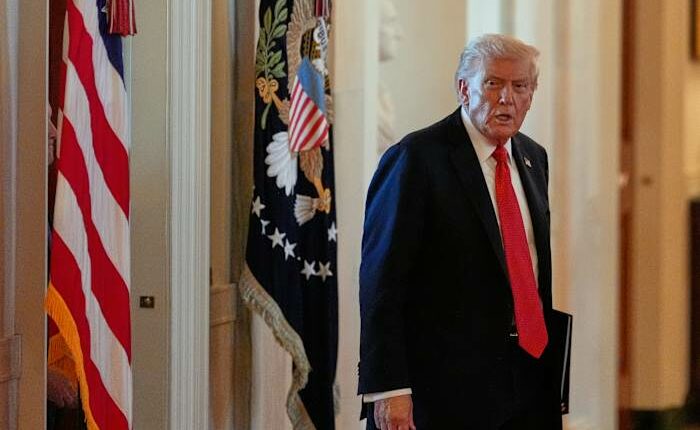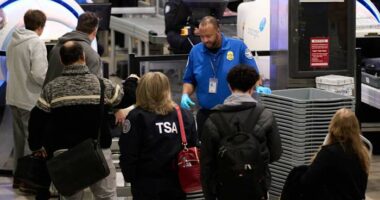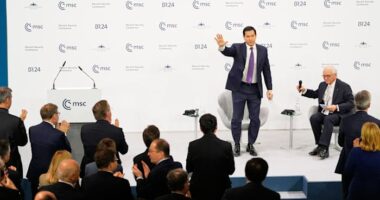Share this @internewscast.com

WASHINGTON – President Donald Trump is set to embark on a critical tour of Asia later this week, aiming to address significant global issues that demand careful navigation and resolution.
The trip holds considerable weight as the future of the global economy could be influenced by Trump’s anticipated discussions with Chinese President Xi Jinping. The stakes are high, as failure to ease trade tensions might further impact American industries already shaken by the president’s tariff policies, governmental layoffs, and political maneuvering.
Since taking office in January, Trump’s approach has seen both successes and setbacks. For instance, while hostages were returned by Hamas to Israel, the Middle Eastern ceasefire remains unstable. Additionally, the U.S.-China trade war has experienced fluctuating tensions, and despite Trump’s efforts, Russia’s invasion of Ukraine continues unabated.
Details about Trump’s journey remain somewhat unclear, with the White House yet to release a comprehensive itinerary. However, the president mentioned plans to visit Malaysia for a regional summit and Japan to discuss foreign investment opportunities.
In South Korea, Trump intends to tackle further trade discussions and hopes to meet with Xi. Although Beijing has not confirmed the meeting, the leaders have recently exchanged threats concerning tariffs and export limitations.
Speaking to reporters aboard Air Force One on Sunday, Trump expressed optimism about his rapport with President Xi. He indicated a willingness to reduce tariffs if China reciprocates by purchasing U.S. soybeans, curbing the flow of fentanyl components, and lifting restrictions on rare earth minerals crucial for high-tech production.
Trump expressed even more confidence on Monday, saying, “I think we’re going to end up having a fantastic deal with China” and “it’s going to be fantastic for the entire world.”
This will be Trump’s first trip to Asia in his second term
With just days to go before Trump leaves, there’s an unusual level of ambiguity even for a president who loves to keep people guessing about his next move.
“The whole trip has seemed so uncertain from the beginning,” said Bonnie Glaser, a managing director at the German Marshall Fund, a Washington-based think tank.
It’s Trump’s first trip to Asia since returning to office. Although he’s hosted leaders from the region at the White House, he hasn’t forged the kind of foundational relationships that he has on other continents.
Trump’s approach to Asia has focused on using tariffs to realign what he describes as unfair trade practices, unnerving countries that depend on the United States as the world’s largest market for exports. There’s also anxiety about Trump’s meeting with Xi, and the potential that a feud between the two leaders could send the international economy into a tailspin.
“There will be some appreciation for the fact that he’s there, but I don’t think it will go far enough to quell the doubts that are pervasive in the region,” Glaser predicted.
The Republican president has downsized his foreign policy team since his first term, eschewing the typical array of advisers at the National Security Council in favor of a core group of loyalists.
“There’s not very many White House staff to do this kind of work,” said Rush Doshi, who worked on China policy under President Joe Biden. “All of this puts us in uncharted waters.”
Michael Green, who worked on President George W. Bush’s National Security Council and now leads the United States Studies Centre in Sydney, Australia, said there’s been no clear Asia strategy from Trump.
“Everyone is waiting to see where he’s going to come down on all of this,” he said.
Others say Trump’s approach is paying off. Anthony Kim, a research fellow in international economic affairs at the Heritage Foundation, said Japan and South Korea are eager to work with the administration to solidify partnerships.
The message from them has been “let’s sit down, talk about relevant details to make a deal,” Kim said.
Trump’s plans remain in flux as the trip approaches
Malaysia is hosting the Association of Southeast Asian Nations, an annual summit that Trump attended only once during his first term, even skipping it when it was held virtually during the COVID-19 pandemic.
However, this year the summit offers an opportunity to highlight Trump’s peacemaking efforts, which he’s made central to his foreign policy agenda.
Thailand and Cambodia skirmished along their disputed border over the summer, and Trump threatened to withhold trade deals with each country if they didn’t stop fighting.
“They were willing to come together and talk to avoid more economic pain,” said Ja Ian Chong, a political science professor at the National University of Singapore.
Malaysia and the U.S. have been working toward securing an expanded ceasefire. The Malaysian foreign minister said Trump “looks forward” to the signing of an agreement at the summit.
Trump’s next stop is Japan. Washington and Tokyo reached a trade agreement earlier this year, which included the promise of $550 billion of investments in U.S. projects.
Japan is in a moment of political transition, with Sanae Takaichi expected to become the first woman to serve as prime minister next week.
Takaichi is a protégé of Shinzo Abe, a former prime minister who was assassinated after leaving office. Trump was close with Abe during his first term, and Green said Takaichi “has the potential to also play that role.”
Working with Trump and keeping him committed to U.S. alliances “requires a level of interaction and trust that none of the Asian leaders have,” Green said.
South Korea is Trump’s final stop on his trip
The climax of the president’s journey will likely be South Korea, which is hosting this year’s Asia-Pacific Economic Cooperation summit. Trump has said he’ll sit down with Xi while he’s there.
Tensions have increased in recent weeks, particularly with China’s announcement of restrictions on exports of rare earth minerals. Trump threatened to retaliate with tariffs so high that he admits they would be unsustainable.
Doshi, the former Biden adviser, said there are three potential outcomes from Trump’s meeting with Xi — “deal, no deal or disaster.” He said China is emboldened after Trump backed down on an earlier tariff announcement when Beijing restricted the export of rare earth magnets.
“The Chinese feel they have President Trump’s number,” Doshi said. “They feel that if they push on this, he’ll fold.”
Trump said Monday that China has “treated us with great respect” since he’s been in office. He said “I could threaten them with many other things,” but “I want to be good to China.”
Another open question will be Trump’s trade negotiations with South Korea, which is facing U.S. tariffs that could undermine its auto industry. However, Seoul has balked at Trump’s demand for a $350 billion investment fund similar to the one in Japan.
“There’s some momentum to the talks,” said Wendy Cutler, who spent more than two decades as a U.S. trade negotiator and is now senior vice president at the Asia Society. “But I don’t want to overstate it, because there are some fundamental differences about this fund that need to be sorted out.”
She said it’s not unusual for talks to go down to the wire, but this time “there are so many balls in the air.”
___ Associated Press writer Josh Boak contributed to this report.
Copyright 2025 The Associated Press. All rights reserved. This material may not be published, broadcast, rewritten or redistributed without permission.











